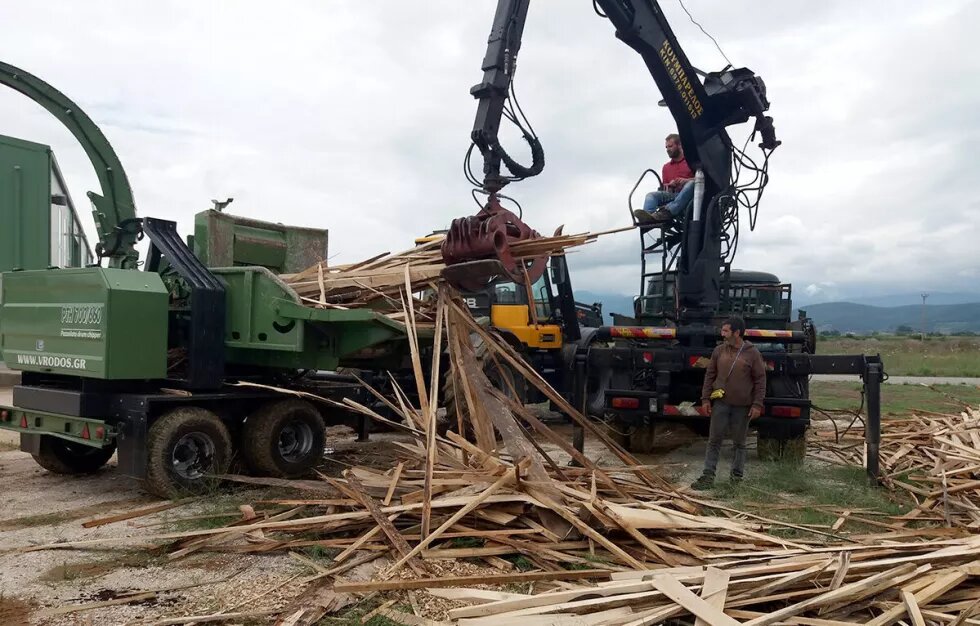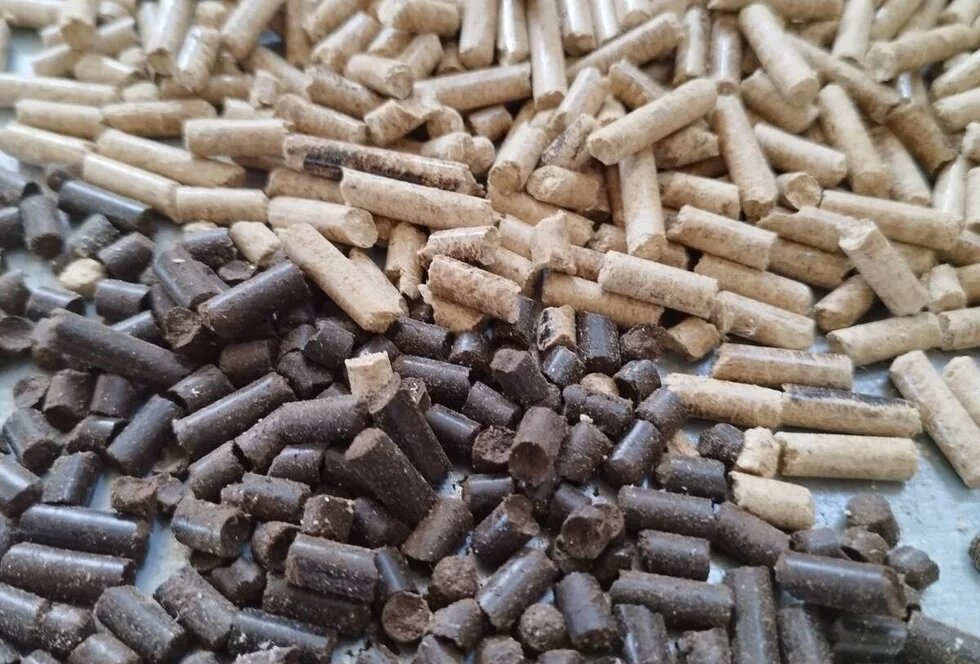
Community energy is key to action on the climate crisis. It can empower people, boost local economies, and reinvigorate communities. Community-led initiatives play an important part in the transition towards a 100% renewable and just energy future. Success stories of community energy projects can be found all over Europe. At REScoop.eu we want to highlight these stories to further accelerate the movement towards a cleaner and democratic system.
Earlier this month [May 2023], we travelled to Greece for our Community Energy Spring Gathering where we met Karditsa Energy Community (ESEK) to learn more about their biomass project and the social impact they have had in the region.

Unleashing the value of residual biomass
Until recently, the picturesque region of Karditsa, Greece, overlooked the potential of its residual biomass, deeming it worthless and leaving it unused. However, Karditsa Energy Community – known as ESEK – saw an opportunity to harness this biomass to produce pellets, thereby creating a value chain that benefits biomass suppliers, transporters, and local citizens.
Vasileios Filippou, forest manager and member of ESEK, sheds light on their motivation to embark on this project.
“Each year, our region produces thousands of tonnes of residual biomass from wood processing companies, municipal pruning, and various agriculture fields and forests. If left in the forest, this biomass can create a fire hazard; while burning agricultural leftovers in open fires leads to CO2 emissions, smoke pollution and health issues. Therefore, we decided to give it value and produce energy.”
Importantly, ESEK solely utilises residual biomass, emphasising their commitment to sustainability. “We don’t talk about cutting trees or developing alternative cultivation; we use biomass that was previously considered waste”, Vasileios emphasises.
Today, ESEK has over 350 members and operates a pellet factory that processes biomass into 1,200 tons of pellets annually. These pellets are then used for heating or cooling, meeting a significant portion of the region’s energy demand. ESEK members enjoy the benefit of acquiring these pellets at a reduced price, creating a localised and sustainable energy solution. “We create a product for the local community using local resources, keeping everything within our community”, Vasileios summarises.
Breaking the vicious circle of the supply chain
The early stages of Karditsa Energy Community presented several challenges, most notably the absence of a reliable biomass supply chain. Despite farmers’ willingness to contribute with their biomass, they were hesitant to sign agreements until they witnessed an operating plant. To secure the necessary funds for constructing the plant, ESEK approached a bank for a loan, but the bank requested documentation to assess the project’s viability. Vasileios describes the situation as “the paradox of the chicken and the egg”.
Ultimately, ESEK successfully broke the vicious circle by securing 50% of the required funding through the LEADER+ programme of the European Union, while the remaining 50% was financed by member fees. This achievement allowed the community to establish the pellet plant in 2017, thereby laying the foundation for a sustainable biomass supply chain.
Expanding the scope: Coffee grounds to heat houses
In 2022, in a remarkable expansion of their biomass supply chain in the framework of the BECoop project, Karditsa Energy Community started using residual coffee grounds. With appropriate processing, these coffee grounds can be transformed into 100% natural, high-quality pellets. This innovative approach offers an exciting opportunity for a region that generates over 600 tonnes of residual coffee per year, as estimated by ESEK. Explaining the rationale behind this initiative, Vasileios states:
“We aim to engage the local community. But when we talk to citizens about the circular economy and wood processing, it may seem distant to them. However, by using a residue they are in touch with every day, they can easily understand that it is not just garbage, but a raw material that can become fuel.”
To implement this idea, the energy community, in cooperation with non-profit organisation InCommOn, approached local coffee houses and families, requesting them to dispose of their coffee waste in dedicated bins. Luckily, many of them agreed, creating a sustainable supply chain for the residual coffee.
Building on this success, last winter, ESEK collaborated with the municipality of Karditsa to install a biomass boiler fuelled by coffee pellets in a local kindergarten. This new boiler replaced an old oil boiler, meeting the building’s heat demand at a lower cost and with reduced environmental impact. Encouraged by this initiative’s positive outcome, the energy community now plans to install additional biomass boilers in municipal buildings, expand their network of coffee bins, and engage more citizens in the process.
Creating economic value and tackling energy poverty
ESEK’s activities and projects have not only contributed to the region’s environmental sustainability, but have also generated economic activity in an area with a high unemployment rate. In addition to the five direct employees at the pellet plant, the operation has created indirect employment opportunities in the transportation of the biomass, the distribution of the pellets, technical maintenance, and the provision of machinery. However, biomass owners and forest cooperatives now enjoy additional income from the utilisation of previously discarded residual biomass.
In a collaborative effort with the municipality and a local school, Karditsa Energy Community launched an action to address energy poverty. Under the slogan “Don’t throw away your fuel”, teachers and students from the school collected residual coffee, which was then transformed into pellets by ESEK and donated to the municipal service supporting vulnerable families. Vasileios proudly exclaims, “we donated one tonne of coffee pellets”! Going forward, they aim to replicate this type of campaign.
Looking to the future: solar energy and collaborative ecosystems
ESEK has even more ambitious plans for the future. They aspire to produce renewable energy using solar panels and allocate a portion of the production to vulnerable families. However, their application to connect a solar park to the overloaded Greek electricity grid, was initially rejected. Vasileios remains hopeful that they will eventually receive the necessary permission to build a solar PV plant within the next one or two years. Over the next decade, he envisions Karditsa energy community as an organisation with a substantial number of active members involved in various projects, creating a local ecosystem where collaboration is key.
The social impact of energy communities in Greece
The work carried out by ESEK is just one example of the multiple benefits provided by community energy. Beyond clean energy production, energy communities have a significant impact on society, encompassing economic, environmental and social dimensions.
The Heinrich Böll Foundation Greece and ELECTRA Energy cooperative conducted an analysis of the social impact of energy communities in Greece, identifying over 20 benefits and best practices. The findings are published in a report available in English and Greek, shedding light on the positive contributions made by energy communities in the country.
This article was first published on 30-5-2023 in rescoop.eu website under the title ‘May success story: Creating value and social impact with residual biomass’.


